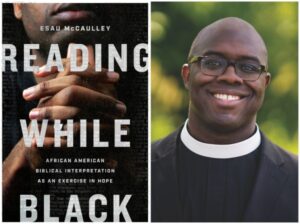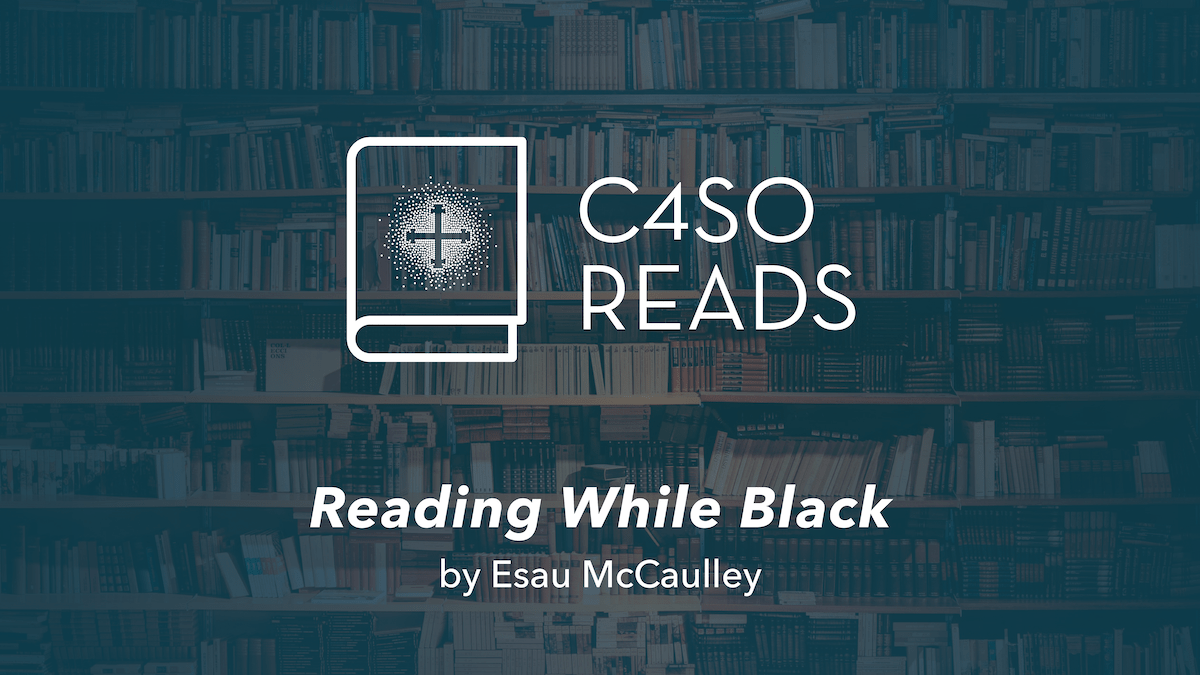by Peter White
 “After this I looked, and behold, a great multitude that no one could number, from every nation, from all tribes and peoples and languages, standing before the throne and before the Lamb, clothed in white robes, with palm branches in their hands” (Revelation 7:9).
“After this I looked, and behold, a great multitude that no one could number, from every nation, from all tribes and peoples and languages, standing before the throne and before the Lamb, clothed in white robes, with palm branches in their hands” (Revelation 7:9).
I am so grateful for all those who participated in our C4SO Reads group that read through our Canon Theologian Esau McCaulley’s Reading While Black: African American Biblical Interpretation as an Exercise in Hope. In September and October, we had 12 to 20 individuals from around our diocese gather on bi-weekly Zoom calls, along with others who chimed in on our private Facebook group. This initiative of C4SO’s Revelation 7:9 Task Force for Racial Diversity and Inclusion prompted a fruitful time of sharing, being challenged, learning, and processing together. Thank you to my co-facilitator the Rev. Kimberly Deckel and all of you who showed up, volunteered a thought, or left a comment.
Comedian Dave Chappelle recently hosted “Saturday Night Live.” In his monologue, he gave a great (though non-theological) illustration of why white people need Black people. “You need us. You need our eyes to save you from yourselves,” he says. “Remember when white people and Black people couldn’t be together? It was just white people on their own, dancing in a club. You ever see that old footage? How’d they look?” At this point, he starts gyrating his hips super awkwardly.
“You need some Black eyes to look at you like…” And here his eyes go wide, and he cocks his head in a disapproving look. “Uh, uh. Stop doing that!”
It feels like many of us are on a journey—on a personal level, but also corporately as a diocese and probably as an Anglican province, too—of listening well and generously to the life experience of those from different cultures than our own. We need the eyes of other cultures to help us see our blind spots. For the white participants in the group, Esau’s book was important because it pointed to how a different culture interprets the Bible. For the Black participants in the group, Esau’s voice represented someone who looks like us joyfully and articulately inviting us to read the Bible and follow Jesus.
Early in the book, Esau makes a distinction between the religion of those who held slaves and the Christianity of Jesus and the Bible. I remember in one of our sessions, one individual reflected on how crucial it is to articulate this difference. I personally live in a context where if you’re Black and you want to be a spiritually disciplined person, then the Black Hebrew Israelites and Nation of Islam provide compelling alternatives to white Evangelical Christianity. It makes an incredible difference to know there is an orthodox version of the Christian faith that exists apart from those who have defended slavery with Bible verses.
Others in the C4SO Reads group were struck with Esau’s discussion of the “Slave Bible”—that version of the Bible that was edited by slaveholders to enforce their racial hierarchy over Black slaves. We talked about some of the ways we still read a “Slave Bible” today by our convenient, selective readings of Scripture that justify our political and social ideologies. Some group participants noted how reading this book was changing the way they heard the Psalms as they practiced the Daily Office in the Book of Common Prayer. They saw the word “justice” pop out like a jack-in-the-box. Also, they saw how God’s character of opposing the proud and giving grace to the humble was a consistent thread throughout the Old Testament prophets, especially Isaiah. Esau’s chapter about the Gospel of Luke was particularly insightful in this way, too.
We were also affirmed and encouraged by Esau’s observation that this aspect of God’s character—He is a God of justice, He hears the cries of the suffering, and He is stubbornly determined to do something about it—is a consistent theme throughout the collects of the Book of Common Prayer.
We all need different eyes to help us on our journeys. Esau’s book is an excellent resource for exactly that. Whether you need that for yourself or for your congregation, Reading While Black is eyes to see Jesus more fully. It helps us to more deeply appreciate that we belong with every nation and people before His throne.
Have questions or suggestions for future books? Let us know.
 The Rev. Peter White is a spiritual director and curator of The Sabbath Life, a resource of contemplation and rest for those on the journey. After 10 years in college ministry, he currently serves as a corporate chaplain at a car dealership. He has a D.Min. in contextual theology where he explored race, culture, church, and mission in a gentrifying neighborhood. Peter, his wife Jackie, and their two grade-school kids live in a historic neighborhood north of downtown Tulsa, OK, one of the city’s most diverse communities, where they are discerning a church plant.
The Rev. Peter White is a spiritual director and curator of The Sabbath Life, a resource of contemplation and rest for those on the journey. After 10 years in college ministry, he currently serves as a corporate chaplain at a car dealership. He has a D.Min. in contextual theology where he explored race, culture, church, and mission in a gentrifying neighborhood. Peter, his wife Jackie, and their two grade-school kids live in a historic neighborhood north of downtown Tulsa, OK, one of the city’s most diverse communities, where they are discerning a church plant.

